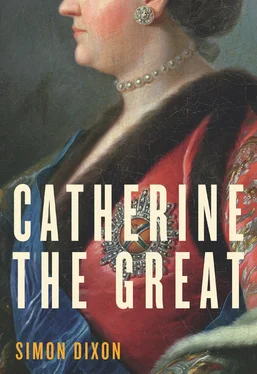The fate of the empress’s Instruction in the new century seemed to confirm the point. At first, the signs seemed optimistic. Appointing her former favourite, Peter Zavadovsky, to chair a new commission to codify the laws in 1801, the tsar considered it ‘almost superfluous to note…that the suppositions in the Nakaz by my Most Kind Grandmother, the Empress Catherine II…may cast great light on the commission’s work. You know this better than anyone else.’ 48For some, such as the poet Derzhavin, the treatise had always remained an object of veneration. While the Russian transcript had been sent to the Senate in 1777, the French original had been placed in a bronze casket at the Kunstkammer, where it was exhibited to foreign visitors and taken to meetings of the Academy of Sciences. The casket and its priceless contents remained on the table at the Academy at its centenary celebrations in 1826. 49Neither did Catherine’s treatise lack practical application. Predictably ignored in the reign of Tsar Paul, it was quoted in at least forty-one court cases under Alexander I. 50Turning to the Nakaz in the context of the proposed codification of the laws, the liberal Alexander Turgenev remarked that though it may only have been a work of theory, it had done more to educate and enlighten the conscience of Russian judges than twenty reprints of the Muscovite law codes. For all this enthusiasm, however, few people seem to have read the Nakaz . By 1817, the fiftieth anniversary of the Legislative Commission, Nikolay Turgenev was urging another of his brothers to read Bibikov’s memoirs to discover that the empress’s efforts were ‘not so risible as people generally think’. In the following year, 1421 copies of the empress’s treatise were pulped at 4 roubles 5 kopecks per pood. 51
However promising an official revival of Catherine’s principles may have seemed in 1801, the opportunity had evaporated almost as soon as it emerged. Although his grandmother’s name appeared in a number of edicts promulgated by Alexander I between his accession and his coronation, it subsequently disappeared from view. In practice, his early reference to Catherine’s ‘heart and soul’ was no more than a rhetorical disavowal of his father’s arbitrariness. Early in the new reign, Dashkova was disturbed to learn that ‘for all the disagreement among the people surrounding the emperor, they were unanimous in disparaging the reign of Catherine II and instilling in the young monarch the idea that a woman could never govern an empire.’ 52To attempt to turn the clock back would have been hard enough even had the tsar had no aspirations of his own. But his determination to take an ethical approach to both foreign and domestic affairs was in itself sufficient to question Catherine’s morals, as Karamzin doubtless realised when criticising the personal ‘foibles’ that made him ‘blush for mankind’ in his Memoir on Ancient and Modern Russia , written in 1810–11. 53Mikhail Speransky, the tsar’s leading minister between 1808 and 1812, was a genuine constitutionalist with little time for Catherine’s style of absolutism. Dismissing her gurus Montesquieu and Blackstone as ‘superficial minds’, Speransky was scathing about her attempts simultaneously ‘to enjoy all the benefits of despotism with all the honour of philosophical conceptions’: ‘Comparing her instructions and various economical and juridical institutions with the unlimited power and accountability of the administrators, one might say that our laws were written in Athens or England, and our mode of government borrowed from Turkey.’ 54
The empress’s fascination with the French Enlightenment seemed equally suspect to a generation which had been taught by French émigré propaganda and the dictates of international politics to regard the philosophes as perfidious mentors. ‘Posterity judges, and will judge, Catherine with all human prejudice,’ wrote Countess Golovina. ‘The new philosophy, by which she was unfortunately influenced, and which was the mainspring of her failings, covered as with a thick veil her great and fine qualities.’ 55The Napoleonic invasion of Russia in 1812 understandably made such anxieties more urgent. Ascribing ‘all our mistakes’ to ‘the French alone’, Ivan Muravëv-Apostol blamed the philosophes for the decline of French morals from the time of Louis XIV. It was then, he declared, that ‘the light of true enlightenment begins to fade; talents are employed as a weapon of depravity, and that most dangerous of sophists, the false-sage of Ferney [Voltaire], strains every nerve of his extraordinary mind over the course of half a century to strew with flowers the cup of hemlock he prepared to poison future generations’. The poet Konstantin Batyushkov could only watch in horror as the fall of Moscow set the seal on a catalogue of French treachery: ‘And this nation of monsters dared to speak of freedom, of philosophy, of humanity! And we were so blind that we imitated them like apes! How well they have repaid us!’ 56Once Alexander had made his own glory by defeating Napoleon, any lingering need to cling to his grandmother’s skirts was finally removed. Celebrating the tsar’s ‘subjugation of Paris’ in 1814, when he rode down the Champs Elysées at the head of his troops on a magnificent white charger, Derzhavin was led to wonder whether even ‘Peter and Catherine were as great as you’. 57
* * *
Nicholas I, who succeeded his brother in 1825, was certainly not the man to restore Catherine’s reputation. Born in the year of her death, nineteen years younger than Alexander, he had no personal memory of his grandmother. So notorious did Nicholas’s hostility to her memory become that in 1885 a set of miniature portraits of the tsars was identified as his on the grounds that only Catherine’s and his own were missing. Devoted, like his father, to the martial image of Peter the Great, and exuding the same uncompromising masculinity, Nicholas did little to hide his contempt for Catherine’s legacy. Even before her beloved Russian Academy was absorbed into the Academy of Sciences in 1841, the Chesme Palace was converted into a dilapidated home for invalids, while the palace at Tsaritsyno became a barracks, the ultimate symbol of the Nicolaevan regime.
It cannot have been an unmitigated pleasure for Nicholas to be reminded in 1826 that Catherine’s armies, ‘less numerous and less well trained than now’, nevertheless achieved ‘great feats, worthy of Greece and Rome’. 58Neither can the tsar’s hypersensitive ear have failed to detect the reproachful overtones emitted by a chronicler of the Cadet Corps who proclaimed Catherine’s ‘glorious’ reign as ‘unforgettable’, and went on to praise Count Anhalt, the director of the Corps between 1786 and 1794, for an Enlightened regime whose values could scarcely have been further removed from Nicholas’s militarism. 59Even under Nicholas, Catherine’s name continued to be raised in defence of intellectual independence. Nikolay Polevoy reminded readers of his Moscow Telegraph how well she had understood the loss to her reign ‘had poetry, art and sciences not added their voices and their glory to the thunder of military victories and the dazzle of courtly magnificence’. 60In a memorandum of 1833 ‘On the silence of the Russian press’, Prince Peter Vyazemsky stressed that an unmuzzled European press had been Catherine’s ‘brave and faithful servant’. 61And the Decembrist Alexander Kornilovich mused from his confinement in the Peter-Paul fortress that ‘Catherine loved Russian literature, and Derzhavin, Dmitriev and Karamzin appeared. They could be found now, if only they were sought out.’ 62
In the light of the Russian elite’s experiences under Tsar Paul, Catherine’s generosity towards her subordinates seemed even more deserving of praise. Anecdotes about the empress published in the first three decades of the nineteenth century portrayed a ruler who was equally well disposed towards each of her subjects, generous in her mercy, just in her punishments, tolerant of human weaknesses and severe only towards herself. 63Catherine, in other words, had been an autocrat, but not a despot. Sumarokov claimed that not a single instance of ‘cruelty, vengeance, the intensification of punishments or menacing autocracy’ was to be found in the whole of her reign. For all her superhuman energy—following Perekusikhina he suggested that the empress had been blessed with ‘miraculous quantities of static electricity’—Catherine was a model of self-control whose heart never dominated her head. ‘He who can govern himself in this way is worthy to rule the universe.’ 64Remembering how the empress had protected him from intrigue, Prince Dolgorukov observed that ‘with such a tsaritsa’ every subject could ‘labour with pleasure’ and relax in the knowledge that he was trusted. Under Catherine, ‘fools were not frightening and scoundrels were not dangerous’. 65Such a tolerant monarch could not only forgive her servants their every misdemeanour, but would also respect loyal ministers even when she did not admire them. Repeated in anecdote after anecdote, this point was driven home by Pushkin in his History of Pugachëv . Catherine, he reminded the notoriously mistrustful Nicholas I, ‘knew how to overcome her prejudices’. 66
Читать дальше












